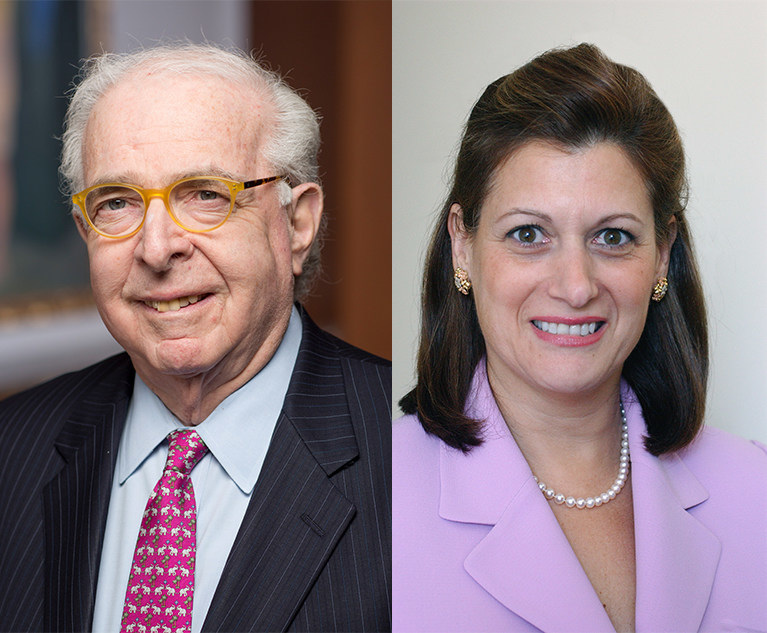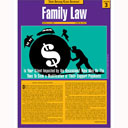Phyllis K Saxe

June 22, 2023 | New York Law Journal
A New Development in the Law of Special EducationA discussion of 'Perez v. Sturgis Public Schools,' a new and important development in Special Education Law. The decision has clarified the importance of public school district compliance with the Individuals with Disabilities Education Act.
By David B. Saxe and Phyllis K. Saxe
7 minute read

September 13, 2007 | New York Law Journal
Special Education LawPhyllis K. Saxe, an attorney, writes that in 2005, the Supreme Court held that there was no persuasive reason to depart from the normal rule of allocating the burden of proof to the party seeking relief in an administrative hearing convened under the IDEA, normally the parents of the disabled child. What was left open was the possibility that states could overcome the unfairness of this decision by establishing their own burden of proof rules for impartial hearings, which New York has now done.
By Phyllis K. Saxe
6 minute read

June 16, 2006 | New York Law Journal
Special Education LawPhyllis K. Saxe, a New York City practitioner, writs that the pluses and minuses of federal and New York State statutes on the special education of a child with disabilities who voluntarily attends a private school are cogently illustrated in a case decided by Judge Jack B. Weinstein.
By Phyllis K. Saxe
10 minute read

November 27, 2007 | New York Law Journal
Special Education LawPhyllis K. Saxe, an attorney, writes that two courts have ruled that individuals do not have a private right of action under the NCLBA. Nevertheless, given the broad emphasis on individualized education promoted by the IDEA, it is conceivable that a successful claim may be pursued asserting that schools are in violation of the IDEA when they alter a special education students' IEP in an effort to have the disabled student meet the NCLBA's state assessment standards.
By Phyllis K. Saxe
10 minute read

May 15, 2008 | New York Law Journal
Special Education LawAttorney Phyllis K. Saxe discusses Jennifer D. ex rel. Travis D. v. New York City Department of Education, a case which explores the requirement that the individualized education program, the device through which educational services for a disabled child are administered, must provide for education in the least-restrictive environment.
By Phyllis K. Saxe
12 minute read

April 25, 2006 | New York Law Journal
Special Education LawPhyllis K. Saxe, an attorney in New York City who specializes in laws affecting people with disabilities, reviews a recent U.S. Court of Appeals for the Second Circuit decision, A.R. v New York City Board of Education, which upheld awards of attorney's fees for those who represent parents at state administrative impartial hearings and were successful in obtaining favorable settlements for their disabled children.
By Phyllis K. Saxe
9 minute read

August 05, 2009 | New York Law Journal
Special EducationPhyllis K. Saxe, a New York City practitioner, reviews a recent U.S. Supreme Court case that resolved the question of whether the 1997 amendments to the Individuals with Disabilities Education Act "categorically prohibit reimbursement for private-education costs if a child has not 'previously received special education and related services under the authority of a public agency.'"
By Phyllis K.Saxe
10 minute read

February 19, 2008 | New York Law Journal
Special Education LawAttorney Phyllis K. Saxe writes that the exhaustion of administrative remedies requirement contained within the framework of the Individual with Disabilities Education Act and its implementing state legislation may have a wider scope and reach than previously thought, according to a recent case decided by the U.S. Court of Appeals for the Second Circuit.
By Phyllis K. Saxe
11 minute read

June 23, 2010 | New Jersey Law Journal
Special Education Law and Matrimonial PracticeWe emphasize what we pointed out at the outset: that knowledge of the IDEA on the part of the matrimonial lawyer will serve the best interests of the child whose parents are going through a divorce.
By Phyllis K. Saxe and Sharon Stein
10 minute read
February 10, 2010 | New York Law Journal
Special Education LawPhyllis K. Saxe, a special education attorney in New York, and Sharon Stein, a partner at Stein & Ott, write: Matrimonial lawyers and family law practitioners are often asked to navigate complex areas of substantive law, such as tax law, trusts and estates, and the law of corporations, for example, in order to properly represent their clients. We submit that an understanding of the Individuals with Disabilities Education Act will facilitate the obligation of all lawyers involved in divorce proceedings to reach the result that is in the best interests of the child.
By Phyllis K. Saxe and Sharon Stein
12 minute read
Trending Stories
- 1Silk Road Founder Ross Ulbricht Has New York Sentence Pardoned by Trump
- 2Settlement Allows Spouses of U.S. Citizens to Reopen Removal Proceedings
- 3CFPB Resolves Flurry of Enforcement Actions in Biden's Final Week
- 4Judge Orders SoCal Edison to Preserve Evidence Relating to Los Angeles Wildfires
- 5Legal Community Luminaries Honored at New York State Bar Association’s Annual Meeting



